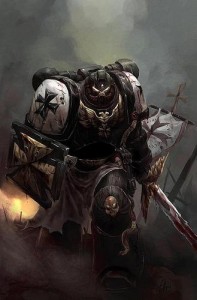 “In the grim darkness of the far future, there is only war.”
“In the grim darkness of the far future, there is only war.”
This quote paints the far-future setting of Warhammer 40k as a bleak and dismal world. The fate of mankind is a constant struggle for survival in a perilous universe that only cares to see you killed. Combats are fast and furious, and those who do not act, die.
It is with this humbling and gothic sentiment that we present:
THE NEW WARHAMMER 40K COMBAT ROUND
Phase 1: Declare Actions
In initiative order, players and GM declare what actions their characters will take. You will get to see other PCs (and opponents) intentions before making your choice. However, you will not know how successful their actions will be until later…
Phase 2: Resolve Actions – Success or Failure
After declaring your action, the GM will give you any relevant information for your action (modifiers, armor, toughness, wounds, etc.). The GM will then move on to the next person. You will make any required rolls and determine the initial outcome of your action while the GM is talking with the other players about their intended actions (determining degrees of Success or Failure, determining hit locations, etc.). Put out markers indicating success + extra degrees (or failure + extra degrees) to facilitate the next phase.
Phase 3: Declare Initial Results
The GM will then receive everyone’s results in initiative order, and make any responses (dodge, parry, forgotten modifiers, etc) to the actions.
Phase 4: Finalize Results
After the GM has responded to your action, make any last rolls (damage, etc.) and give the GM your final results.
This may seem clunky at first, but after an initial learning curve, it will expedite your combats, making them fast and furious!

Something that would make 40k faster for me would be not having to assemble and paint all those damn minis, I hate that!
Ha ha ha!
When declaring before resolving actions, I generally prefer to go in reverse initiative for declarations. This way, the fastest initiative gets the benefit of operating with the most information. It also makes things a bit easier, as people declare, and then the person who goes first gets to resolve immediately, and you go back down the tree.
It can also make for some interesting situations since people are then locked in. Like when the person with the higher initiative deliberately steals a kill before someone else can, and leaving the person with no target to attack.
Tourq failed to post that this house rule applies to the RPG’s of the 40k setting (Dark Heresy, Rogue Trader, Deathwatch, and the upcoming Black Crusade). The intent of this mechanic is to speed up the combat round and keep players engaged and focused on the game instead of waiting up to 90 seconds for one player to perform and resolve their actions before beginning to look at the map and then their character sheet and then deciding if they want to shoot or move or otherwise drag the game to a screeching halt. Full Disclosure: not even tested in-house yet…
@ Anthony: I agree 100% on the reverse order declaration/resolution and would likely use it in Fate, Shadowrun, or any other game that bases Initiative on your ability to take in info from the battlefield, process it and enact your response (i.e some Mental stat used in determining your Init.)…
… that being said, our intention was to expedite round resolution to streamline combats, not drastically change the spirit of the rules. In the Warhammer 40K line of games, initiative is based purely on Agility and does not include any effects from Perception, Intelligence or any other mental skill/attribute. To me, this means that the fastest go first, knowing what they know. It may seem counterintuitive that the slower person has more info at hand and therefore can make a “better” choice than someone else, but by the same token he may be killed before he can even make a choice…